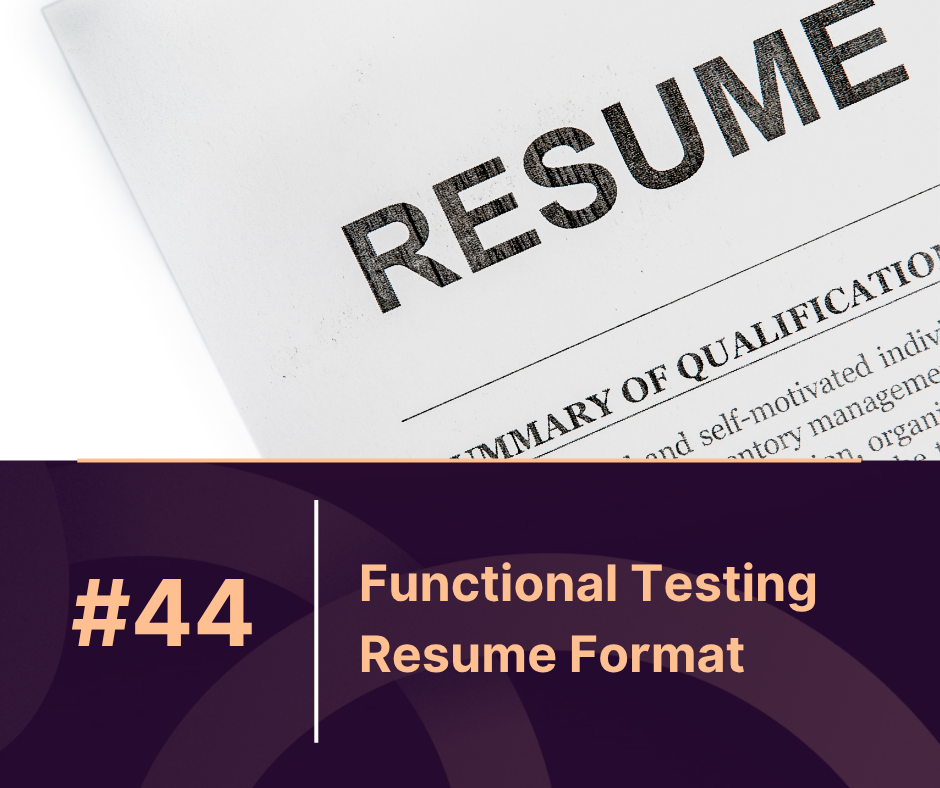Overview
Writing a resume for functional testing roles requires more than just listing tools and test cases. With the rise in automation, Agile workflows, and cross-functional teams, QA professionals must present their skills in a way that aligns with current hiring expectations.
This blog offers a clear step-by-step guide to the best functional testing resume format, including sections to include, formatting tips, sample data, and how to tailor your resume to pass ATS (Applicant Tracking Systems). Whether you’re a manual tester or transitioning into automation, this guide helps you stand out in a competitive market.
Why the Right Functional Testing Resume Format Matters
Recruiters scan resumes in less than 7 seconds, and many companies now use AI or ATS software to filter out unqualified applicants. An optimized functional testing resume format ensures:
-
You pass automated screening tools
-
Key skills and experience are immediately visible
-
Your profile aligns with modern QA expectations
-
You highlight industry-relevant achievements clearly
Key Elements of a Functional Testing Resume Format
Here’s what a high-performing functional testing resume must include:
| Section | Details to Include |
|---|---|
| Header | Name, contact info, LinkedIn, GitHub (if relevant) |
| Professional Summary | 2-3 lines highlighting experience, domains, and tools |
| Skills | Manual testing, SDLC, Jira, TestRail, Agile, SQL, Selenium |
| Work Experience | Role-specific duties, tools used, types of testing, domains |
| Certifications | ISTQB, Agile Testing, Automation Tools, etc. |
| Education | Degree, institution, graduation year |
| Projects | Real examples with metrics and outcomes |
Sample Resume Summary
“Certified QA Analyst with 4+ years of experience in manual and functional testing of web and mobile applications across e-commerce and healthcare domains. Proficient in creating test cases, defect tracking using JIRA, and working in Agile environments.”
This summary is concise, keyword-rich, and clearly conveys expertise.
Choosing the Right Resume Format
There are three main types of functional testing resume formats. Here’s how they compare:
| Format Type | Best For | Pros |
|---|---|---|
| Chronological Format | Candidates with consistent career growth | Easy to read, recruiter-friendly |
| Functional Format | Career changers or testers with gaps | Focuses on skills, less on timeline |
| Hybrid/Combination | Most QA professionals | Balances skills + work history |
Recommendation: Use the hybrid format to highlight your skills while maintaining a professional career timeline.
Tips to Optimize Your Functional Testing Resume
✅ Use keywords like: “test case design”, “defect management”, “test execution”, “JIRA”, “UAT”, and “API testing”.
✅ Keep it 1-2 pages max
✅ Quantify results: “Reduced defect leakage by 30% over 2 quarters”
✅ Customize for each job description
✅ Export as PDF for clean formatting
Mistakes to Avoid
❌ Using a generic resume for all roles
❌ Listing every project without context
❌ Ignoring keywords relevant to the job description
❌ Overloading with technical jargon without clarity
❌ Missing certifications or recent tool knowledge
How MaxProfile Can Help You
If you’re struggling to present your experience in the right way or unsure how to optimize for keywords and ATS systems, MaxProfile helps professionals like you build resumes that match job market trends.
From personalized resume templates to keyword optimization and role-based suggestions, MaxProfile ensures your functional testing resume format meets recruiter and system expectations — giving you a better chance at landing interviews.
Conclusion
Crafting the perfect functional testing resume format isn’t just about style — it’s about strategy. From selecting the right structure to showcasing relevant skills and using industry keywords, every element matters in helping you secure the right QA role.
Whether you’re applying for manual testing jobs or hybrid QA roles, following this structured approach will significantly increase your visibility in today’s tech-driven hiring landscape.
FAQs
What is the best format for a functional testing resume?
The hybrid format is ideal as it highlights both skills and experience, which is essential in QA and testing roles.
How long should a functional testing resume be?
Keep it 1-2 pages long. Be concise and focus on relevant skills, tools, and project impact.
Should I include automation tools in a functional testing resume?
Yes, even if you’re primarily a manual tester. Listing tools like Selenium or Postman shows adaptability.
Is it necessary to list test case tools?
Absolutely. Mention tools like TestRail, JIRA, or qTest to show your practical workflow experience.
How does MaxProfile help with resume building?
MaxProfile offers custom resume formats, keyword suggestions, and role-based optimization so your resume performs well with both recruiters and applicant tracking systems.



